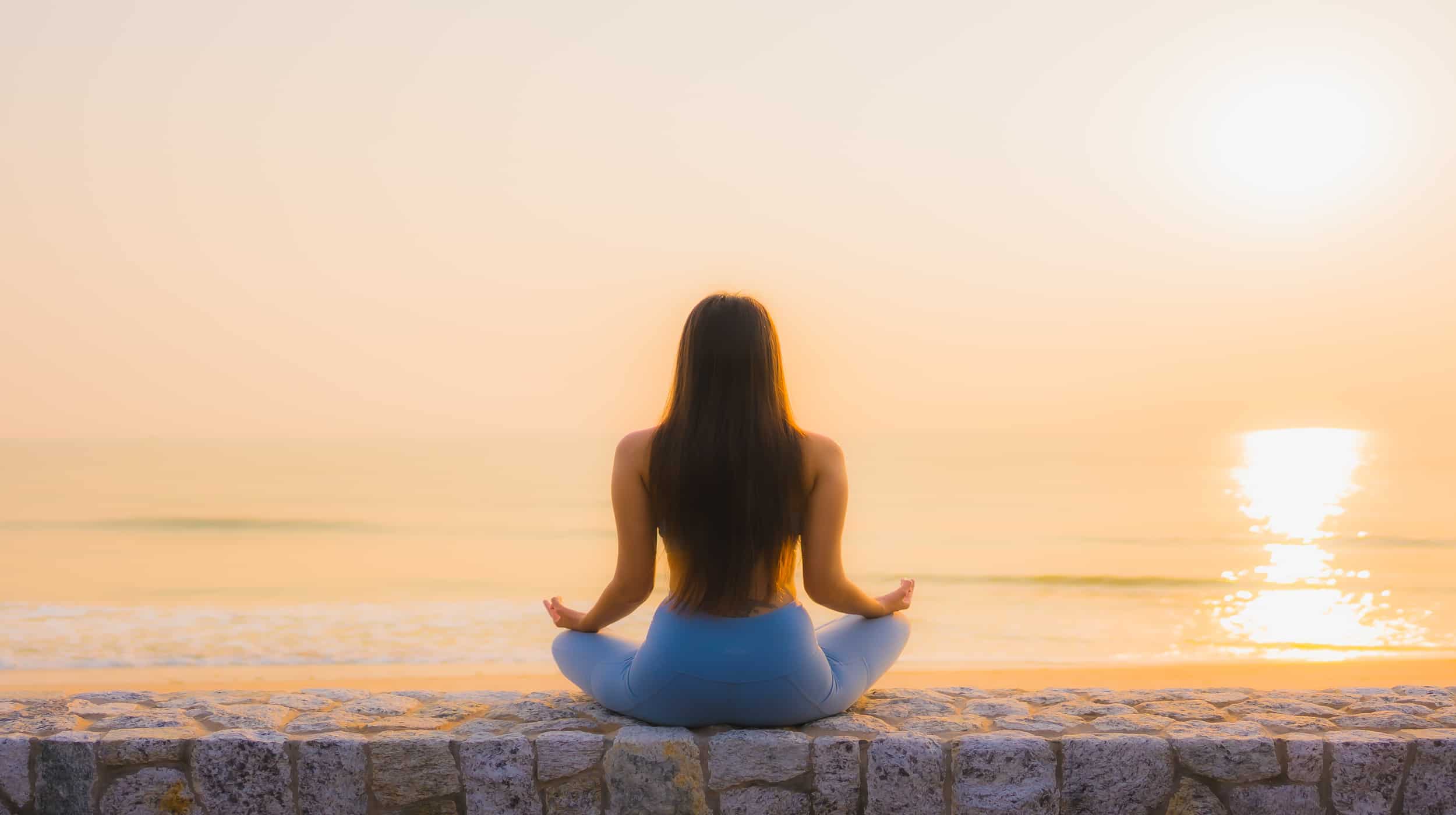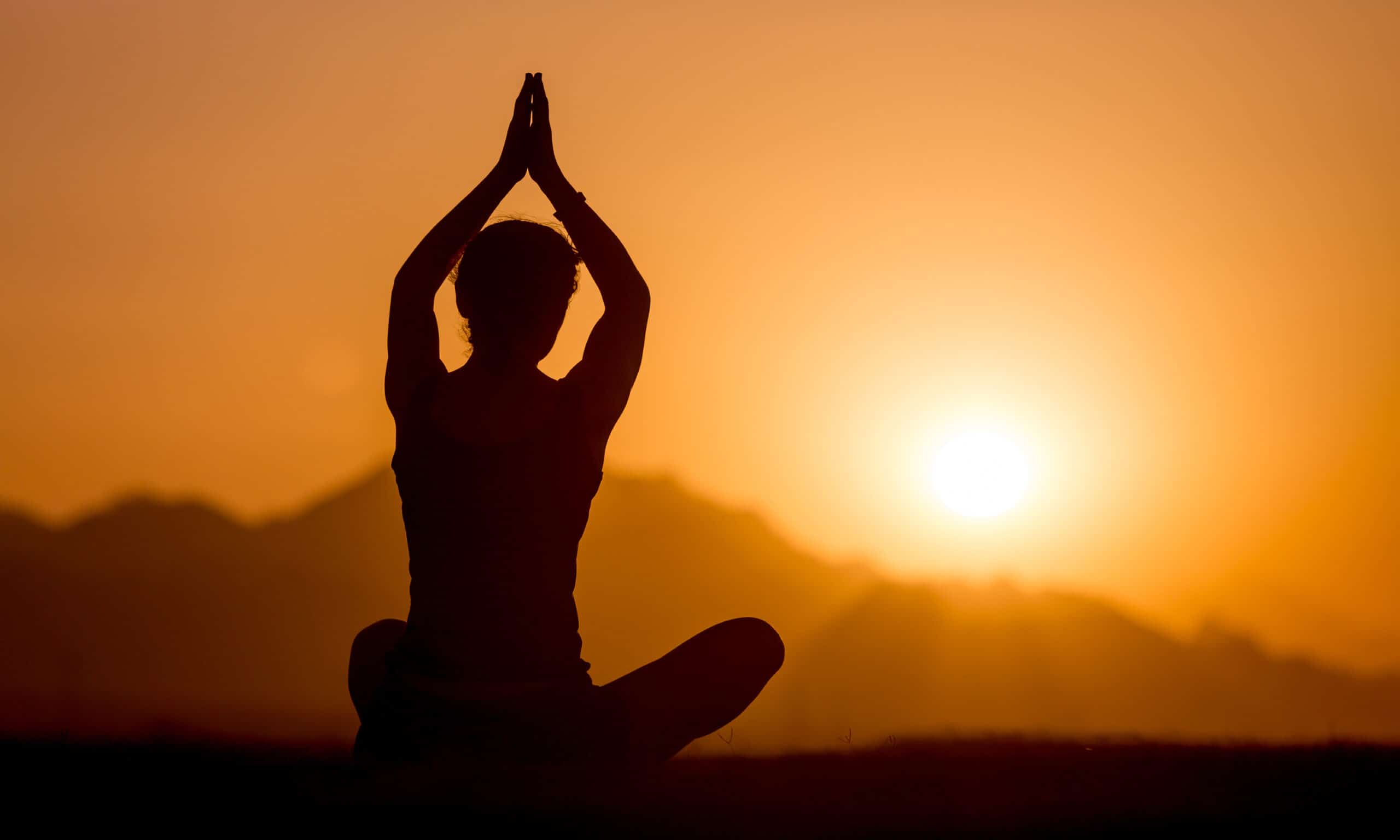The morning hours are the most important hours of the day! Everyone knows that if your morning is perfect, your day will be great! The morning sets the intention of the day, as such practicing morning meditation is vital to kickstart a beautiful and fruitful day.
According to Ayurveda, in the early morning you must spend a minimum of 5-10 minutes for meditation. The same idea was illustrated by Robin Sharma, writer and a world’s top leadership expert; in his new book “The 5 AM CLUB”.
The first hours of your morning are important to gain success in your life. You should spend at least 20 minutes on meditation. For 20 minutes, you can think about your goals, plans of the day or you can create awareness about every part of your body. Welcome your morning with gratitude, peacefulness and set the right mindset for a productive and satisfactory day.
It is very hard to get up early in the morning, but determination is key here. In this article you can learn how to make early morning meditation your habit, why you should choose early morning meditation and how to overcome obstacles which keep you away from a healthy lifestyle.
Along with that you can discover how to do morning meditation with different methods and know more about the health benefits you earn from it.
THE IMPORTANCE OF THE MORNING HOURS

The Calm and Quiet Environment
It’s true for the inner and outer world. In the early morning, everything stands still. It provides calmness for meditation.
The Silence of the Morning
Meditation needs silence to hear the inner voice, the sound of nature. You can observe your own breath in the early hours of the day which provides flow for meditation.
Soft Rays of the Rising Sun
Soft and warm, early sun rays give you a feeling of hope and freshness. It boosts your energy for the whole day.
Empty Stomach
According to yoga studies, you should do meditation or yoga after 3-4 hours of eating. In the morning, you can feel the lightness of your body, which is essential for meditation.
OBSTACLES DURING MORNING MEDITATION
Not a Morning Person
Because of hectic lifestyle or busy schedules, it’s very difficult for some people to wake up early. But no worries, at the beginning, our focus is to do meditation regularly for at least 5 minutes. So as soon as you get up, just sit on your bed and close your eyes for 5 minutes. Focus on your breath, inhale and exhale.
Fail to Concentrate Fully
Everyone who starts doing meditation faces this common obstacle at the beginning of their meditation journey. With lots of disturbing thoughts, people fail to concentrate. This happens with everyone including sadhus, yogis and meditation teachers.
In this scenario, do not get disappointed but stick to your meditation. Do not fight against your thoughts, let them come. Do not entertain the thoughts; just observe them as a third person. Stay calm and slowly focus yourself.
Lack of Time to Meditate
It is a misconception that you must meditate at least 20-30 minutes every morning. In actual, you can meditate for 5-10 minutes. Most of us grab our phones as soon as we get up; unknowingly we spend a minimum of 10-15 minutes using the phone.
As such, instead of surfing on the internet, surf your mind for 5-10 minutes. Once you feel the difference between the day of meditation and a non-meditative day; you will continue your habit of early morning meditation.
Feel Sleepy During Morning Meditation
You can easily feel sleepy due to your sleepless night or the peaceful surroundings. Try to sleep as early as possible. You must get at least 6-7 hours of sleep per night. If you still feel the same, then do a walking meditation.
Yes, you can do a morning meditation while walking. You can walk in your backyardof your own home. While walking, focus on your steps and breathe. Walk slowly and create awareness of your surroundings.
In the morning, there is calmness in the environment; try to listen to nature’s sounds, feel the warmth and observe the early morning sunlight.
METHOD TO MEDITATE
There is no perfect method of meditation; you can choose the posture that you are most comfortable in.
At the beginning, it’s very hard to get up early for meditation and stay consistent. Try to wake up 5-10 minutes before your regular time. At the beginner level, you can do meditation on your bed until you develop the habit of waking up early and meditate.
Just sit cross legged or keep your legs out of bed, close your eyes, and take a deep breath for 2 minutes. Slowly observe your breath and focus on it for 5 minutes. That’s it and you are ready for your whole day’s hectic work schedule.
If you are already an Early Morning Person, then you can do the following routine for your meditation.
1. Choose a calm place without any disturbances.
2. Choose a comfortable meditation position for yourself. You can either sit on the mat with your legs crossed or sit on a chair. The uprightness of the spine is the main idea behind the perfect posture. Keep your hands in your laps, palms facing upwards.
3. Keep your head straight. Depending on your preference, you can open or close your eyes.
4. Take a deep breath on a count of 4 and breathe out on a count of 8. Do it for 2 minutes. It will heighten awareness. Now slowly focus on your breath. If your mind is wandering with lots of thoughts, do not try to resist them; just observe them as a third person. Be aware that you are in the middle of meditation.
5. You can sit like this for 5 minutes at the beginning. Then you may gradually increase your time until 20 minutes.
6. At the end of the meditation, keep your palms over your eyes; slowly open your eyes. Let the eyes feel the morning sun rays.
7. If you can, it’s good to maintain a diary for your meditation. After meditation, you can write your experience in this diary; about your plans for the day or what you feel during meditation.
TYPES OF MORNING MEDITATION
Mindfulness Meditation
In this meditation you have to focus on inhaling and exhaling for 5- 10 minutes. Then try to produce awareness about your body parts, functions. Make yourself calm and relax. A research study about mindful meditation on students shows that mindful meditation is effective in reducing anxiety and stress.
It is also worth to try out various guided meditation videos such as the guided mindful meditation for 10 minutes, by Deepak Chopra, an Indian and American author.
Sit calmly and focus on your deep breath for 2 minutes. Slowly give attention to sensations and try to be aware of them. After 10 minutes, try to feel the energy distributed through the physical, emotional and spiritual heart with peace, harmony, laugh and laughter.
Gratitude Meditation
The word gratitude is derived from the Latin word gratia, which means grace, graciousness, or gratefulness. In one Harvard research study of positive psychology, it was proven that gratitude is strongly associated with happiness.
Gratitude helps people to build good relationships, enrich positive emotions with good experiences and ultimately leads towards good health. You can easily use this source of energy for your morning meditation to enrich present moments with happiness and kick start your day full of positive energy.
To practice gratitude meditation, sit in bed as soon as you wake up for 5 minutes. Close your eyes and think of things for which you are grateful for. It creates positive energy in your mind which you can use throughout your day. End the practice with a deep breath.
Walking Meditation
If you feel sleepy while sitting for meditation, then walking meditation might be the best way of morning meditation for you. In the morning, you can take a 10-15 minutes slow walk either inside your home or out in the park.
In this method, start with deep breaths then slow pace walking; during walking concentrate on your every step. Along with it, give attention towards the colours and sounds of nature. Then slowly think about only one special thing at that moment which you do best. During the walking, try to live in that moment, feel the present moment.
There are many audio and video guided meditations available. Try out Walking meditation by Jim Brickman. He is a famous American songwriter and pianist. In his meditation videos, his voice and music guide you for a walking morning meditation.
HEALTH BENEFITS OF MORNING MEDITATION

1. Reduces Stress and Anxiety
Researchers put forward that meditation may stimulate the parasympathetic nervous system as well as slows down your heart rate and breathing rate, and improves blood flow; which is the reason you feel so relaxed after meditation.
A randomized study of mindful meditation for GAD (Generalized Anxiety Disorder) provides the first evidence-based research where 93 patients followed a 8-week program of mindful meditation.
Anxiety symptoms were measured with the Hamilton Anxiety Scale after the research study. Result shows greater reductions in stress markers for GAD patients who follow mindful meditation.
2. Enforces Positivity and Good Mood
Morning meditation helps you to start your day with more positive thoughts and energy. This helps boost your energy for the whole day. You can face any unwanted problems with a calm peaceful mindset.
One controlled study of mindful-oriented interventions on the clinical and non-clinical community shows that mindfulness is positively associated with a variety of indicators of psychological health. This includes higher levels of positive affect, life satisfaction, emotion regulation and lower levels of negative affect and psychopathological symptoms.
There is also evidence from neurobiological and laboratory behavioral research indicating the potential roles of mindfulness meditation in reducing reactivity to emotional stimuli and enhancing psychological well-being. Mindfulness training may bring about positive psychological effects ultimately.
3. Increases Concentration and Enhances Productivity
Practicing morning meditation fosters concentration as you tend to focus on your breathe and thoughts during the practice. Moreover, if you start your morning with a productive mindset, it will reflect on your whole day.
Morning meditation boosts your thought process towards positivity and reduces unwanted stress, anxiety and depressive thoughts. Morning meditation provides clarity about your day plans and work progress.
It is proven that you can make better decisions in the morning hours. One evidence-based research study was published in the Frontiers Psychology Journal on the effects of meditation of decision making. Result shows that meditation modulates brain activities associated with cognitive control, emotion regulation and empathy, and leads to improved non-social and social decision making.
4. Improves Lifestyle with Good Habits
Good habits are the backbone of a successful healthy life. If you make morning meditation your habit, the other good habits like eating a healthy diet, regular exercise and going to bed early will follow you.
According to a published article of the Harvard Review of Psychiatry, mindful meditation benefits behavior change. Healthy emotional regulations, which are stimulated by meditation, play an important role in behavior changes. It enhances a self-loving nature which indirectly boosts our health promoting habits in conditions such as diabetes, eating disorders or substance abuse.
5. Strengthens Immunity
The early morning clean and clear air with calmness of the environment, provides good air for our lungs and relaxation to the body. Early morning meditation helps to cultivate good habits of exercise, eating good food and early sleeping which directly impact our healthy life. All of these things collectively boost our immunity.
A research article about the effect of mindful meditation on immunity includes 20 research studies involving 1600 people. These studies test the immunity factors such as immunity cell count, antibodies reaction, study of biological ageing cells and specific markers of inflammation. Result suggests possible effects of meditation on immunity factors.
KEY TAKEAWAYS
All in all, morning meditation plays an indispensable role in helping you kickstart your day. With a focused mindset, well-planned goals and to-do list of the day, your day will certainly be fruitful.
We hope tomorrow morning you will start your day with blissful meditation, and you will take the first step towards a healthy peaceful life. Give one opportunity to yourself every morning and there will just be abundant opportunities waiting for you ahead.
Article Sources
HealthxTips is committed to delivering content that adheres to highest standard for accuracy, sourcing and objective analysis.
HealthxTips uses only high-quality and trustworthy sources to support the facts in our articles.
1. Black, D. S., & Slavich, G. M. (2016). Mindfulness meditation and the immune system: a systematic review of randomized controlled trials. Annals of the New York Academy of Sciences, 1373(1), 13–24. https://doi.org/10.1111/nyas.12998
2. Harvard Health Publishing. (2011, November 22). Giving thanks can make you happier. Harvard Health. https://www.health.harvard.edu/healthbeat/giving-thanks-can-make-you-happier
3. Hoge, E. A., Bui, E., Marques, L., Metcalf, C. A., Morris, L. K., Robinaugh, D. J., Worthington, J. J., Pollack, M. H., & Simon, N. M. (2013). Randomized controlled trial of mindfulness meditation for generalized anxiety disorder: effects on anxiety and stress reactivity. The Journal of clinical psychiatry, 74(8), 786–792. https://doi.org/10.4088/JCP.12m08083
4. Keng, S. L., Smoski, M. J., & Robins, C. J. (2011). Effects of mindfulness on psychological health: a review of empirical studies. Clinical psychology review, 31(6), 1041–1056. https://doi.org/10.1016/j.cpr.2011.04.006
5. Kersemaekers, W., Rupprecht, S., Wittmann, M., Tamdjidi, C., Falke, P., Donders, R., Speckens, A., & Kohls, N. (2018). A Workplace Mindfulness Intervention May Be Associated With Improved Psychological Well-Being and Productivity. A Preliminary Field Study in a Company Setting. Frontiers in psychology, 9, 195. https://doi.org/10.3389/fpsyg.2018.00195
6. Schuman-Olivier, Zev MD; Trombka, Marcelo MD; Lovas, David A. MD; Brewer, Judson A. MD, PhD; Vago, David R. PhD; Gawande, Richa PhD; Dunne, Julie P. PhD, RN, PMHNP-BC; Lazar, Sara W. PhD; Loucks, Eric B. PhD; Fulwiler, Carl MD, PhD Mindfulness and Behavior Change, Harvard Review of Psychiatry: 11/12 2020 – Volume 28 – Issue 6 – p 371-394 doi: 10.1097/HRP.0000000000000277








0 Comments